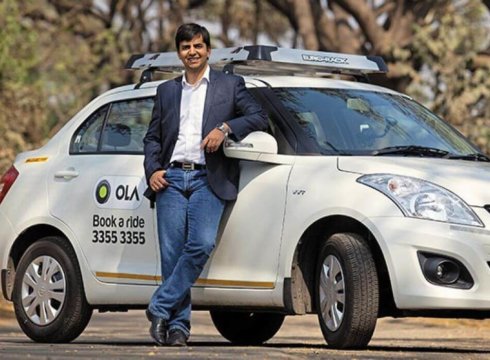SUMMARY
In Line With Its Expansion Goals, The Unicorn Has Already Set Up Teams In Bangladesh And Sri Lanka
Inc42 Daily Brief
Stay Ahead With Daily News & Analysis on India’s Tech & Startup Economy
Home-bred cab aggregator Ola is reportedly looking to set up operations in Australia and New Zealand. The move is aimed at accelerating growth, while also furthering investor Didi Chuxing’s plans to capture the globe ride-hailing market.
In line with its expansion goals, Ola has already set up teams in Dhaka, Bangladesh and Colombo, Sri Lanka. At the time when reports of this development surfaced, sources had revealed that the company was also eyeing expansion in other countries in Asia and North Africa.
Interestingly, Ola’s arch nemesis Uber has a long-standing presence in both Australia and New Zealand. While there are local startups like GoCatch that are operating in Australia’s ride-sharing space, the market is currently dominated by Travis Kalanick-founded Uber.
At present, Uber is present in a total of 23 cities in Australia and New Zealand. Even in Sri Lanka and Bangladesh, the Ola rival has been present for a while now. While Uber launched its Sri Lanka operations in December 2015, it entered the Bangladesh market in November of the same year.
Without directly commenting on Ola’s expansion plans in Australia and New Zealand, a spokesperson for the company stated, “We are committed to our mission of building mobility for a billion people.”
Apart from the countries, the cab aggregator was also eyeing to enter London’s ride-hailing market. As per a report by Business Standard, Ola co-founder and CEO Bhavish Aggarwal had even met London Mayor Sadiq Khan last December for a discussion about the same.
However, according to sources close to the development, Ola is hesitant to set up operations in London as the market is highly-saturated and is currently dominated by rival Uber. A person in the know said requesting anonymity, “You need deep pockets to enter London. The money can as well be used to go into other markets.”
Compared to that, Australia and New Zealand still hold a lot of untapped opportunities for ride-sharing companies like Ola, especially in areas outside major cities like Sydney and Melbourne. As an added advantage, the Australian government legalised ridesharing back in 2015.
Banking on this growing opportunity, Estonia-headquartered cab aggregator Taxify also launched operations in Australia in December 2017.
Ola Aggressively Trying To Capture Indian Cab Aggregator Market
Founded by Bhavish Aggarwal and Ankit Bhati in January 2011, Ola is currently present in 110 cities across the country. Compared to that, Uber is active in only around 29 cities in India. Ola’s wide array of services includes online booking of auto-rickshaws and bikes, as well as vehicles. It has also come up with a connected car platform for ridesharing called Ola Play.
Till date, Ola has raised funding of $3.9 Bn in 11 rounds from about 20 investors. In November 2015, Didi Chuxing along with Baillie Gifford, Falcon Edge Capital, Tiger Global, SoftBank Group and DST Global had participated in a $500 Mn Series F funding round in the homegrown cab aggregator.
The funding round of $350 Mn raised in February 2017 took its valuation to about $3.5 Bn. Later in June, the cab booking platform reportedly picked up about $50 Mn funding from hedge fund Tekne Capital Management, as an extension of its ongoing round.
Later in October, the ride-sharing startup confirmed a $1.1 Bn investment in a round led by Tencent Holdings Limited, in exchange for a 9.75% stake. In the official statement, Ola also revealed that it was in advanced talks with other investors to close an additional $1 Bn as part of the same financing round, taking the total fundraise to over $2 Bn.
Recently, in the month of November, Lee Fixel, Partner at Tiger Global Management, stepped down from the board of Ola. Immediately afterwards, reports surfaced that the US-headquartered hedge fund was gearing up to sell a portion of its stake in the cab aggregator to SoftBank for somewhere around $400 Mn-$500 Mn.
Around the same time, it was reported that Ola is looking to become profitable by FY 2019. As per a valuation report filed with the ministry of corporate affairs compiled by chartered accountancy firm Jain Ambavat and Associates, Ola is projected to become profitable during 2018-19 and report a net operating profit of over $180.7 Mn (INR 1,170 Cr), which is further expected to grow further to $992 Mn (INR 6,423.33 Cr) by FY 2020-21.
The company is also preparing to enter the Indian electric vehicles market. To that end, it has partnered with giants like Tata Motors and Indian Oil.
Earlier this month, Didi Chuxing made a big-ticket investment in Brazilian ride-hailing startup 99. As per reports, the investment raised the startup’s post-money valuation to $1 Bn. After selling its Chinese arm to Didi Chuxing, Uber now controls a 20% stake in the latter.
Uber, on the other hand, recently sold 15% of its stake to SoftBank for an estimated $7 Bn at a $48 Bn valuation (a 68.5% drop from earlier $70 Bn). It should be noted that SoftBank Vision Fund CEO Rajeev Misra had earlier indicated the Japanese conglomerate’s intentions towards making peace between rivals Ola and Uber. In a media interaction in September, Misra had stated, “We own more than 30% in Ola and we would own much less stake in Uber. We have owned the stake in Ola since 2014 and it does send conflicting signals. But we are hoping that we make peace between them at some point.”
While a merger between the two is highly unlikely at the moment, it would be interesting to see who emerges as the winner of the ongoing battle between the two cab aggregators, especially now that Ola has set its eyes on expansion in Australia and New Zealand.
Note: We at Inc42 take our ethics very seriously. More information about it can be found here.


